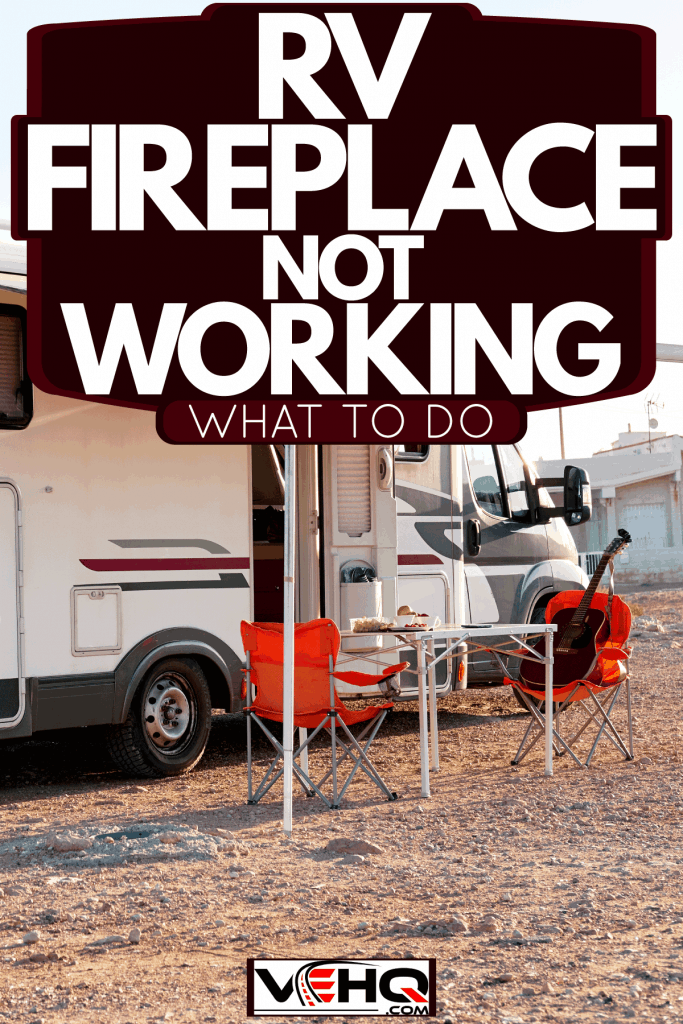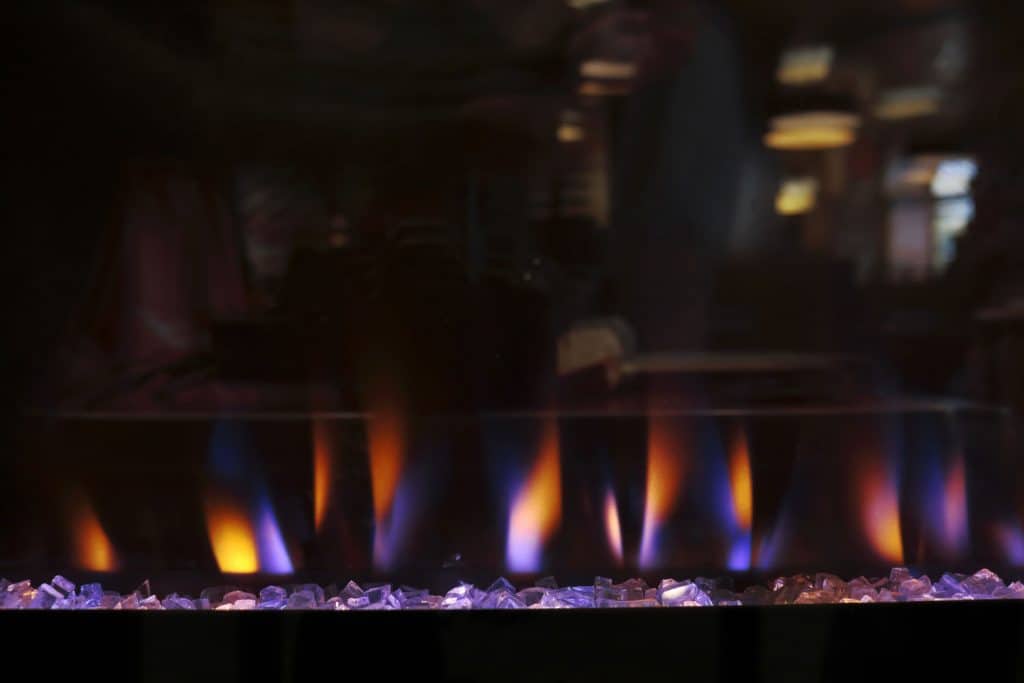There's nothing more luxurious than an RV fireplace. Instead of making camp every night, you can enjoy the warmth and illusion of an electric fire from the comfort of your bunk. Like every part of your RV, though, your fireplace requires regular TLC. If you don't inspect your fireplace regularly, you might wonder why your RV fireplace is not working, and how can you bring it back to life? We've researched this very question to get the answer for you.
If your RV fireplace stops working or hasn't worked in some time, you can:
- Check the power cable and switch
- Inspect your fireplace's thermostat
- Call an electrician to look at the wiring, blower, mirrors, or heating element
- Change the batteries in the fireplace's remote, if applicable
- Make sure the fireplace is as unobstructed as possible
RV fireplaces are most often electric fireplaces, meaning that they can fall victim to the same negative influences that disrupt your lighting, outlets, and other RV essentials. When you know what kind of problems to look for, though, you can get ahead of the worst of your fireplace malfunctions and keep your RV comfortable.

RV Fireplace Not Working - What To Do
RV fireplaces are both aesthetically and practically appealing for campers. These fireplaces help heat up your RV during the cooler months of the year while also adding unique lighting effects to your RV's interior. If you've come to rely on your RV fireplace, you'll want to do what you can to prevent it from getting damaged.

There are several different forces that can cause your RV fireplace to give out. Age and use are some of the most common. While regular maintenance can help you stay ahead of the worst of these effects, there may come the point where an element of your fireplace gives out.
Some of the most common problems you can run into include:
- Regular beeping
- Clicking noises or squeaking
- Fire effect failures
- Failure to heat your RV
- Failure to turn on
- Turning on by itself
- Shutting off mid-use
The good news - in a manner of speaking - is that each of these problems has a different source. If you want to repair your fireplace, it's up to you to identify what's caused one of these problems to arise. The best way to get started is to:
Assess the Problem at Hand
Before you can go about checking your fireplace, determine what kind of problem you're dealing with. For example:
- Frequent beeping tends to indicate that something's wrong with your remote or batteries
- Clicking noises and squeaking suggest damage to your fireplace motor or rod
- Failing fire effects also suggest rod or motor damage, though the damage may also extend to the fireplace's mirrors
- Heating failures can often be blamed on a damaged thermostat
- Fireplaces that don't turn on, turn off in the middle of use, or that turn on by themselves often have wiring issues
One of the easiest ways to try and determine what problem you're dealing with is to remove your fireplace's back panel and turn the system on. If the system responds, watch the inner workings for signs of mechanical failure. If you're not spotting anything, you can even take a tool like a multimeter to test the electrical charge in your wires.
Check Power Cable
Your power cable is one of your fireplace's most sensitive features. If it's been damaged in any way, or if your outlet doesn't work like it used to, then your fireplace won't produce heat or light effects. You can test your power cable for charge, make sure it's plugged in, and otherwise ensure that no fuses in your breaker box have tripped as a result of your fireplace use.
Test Remote Batteries
If you have a remote battery that connects to your fireplace, make sure that your batteries aren't out of juice. You can often turn off frequent beeping with a quick change-over.
Clear Away Fireplace Obstructions
Certain obstructions around your fireplace may prevent its heat from circulating through the whole of your RV. Clear out the space in front of your fireplace and test the system again to see if it starts to warm up.
Inspect Fireplace Thermostat
Your fireplace thermostat detects both the temperature outside of the fireplace and the amount of heat that the fireplace produces. If your thermostat malfunctions, then it won't be able to respond effectively to heating cues. This can result in your fireplace under-heating your RV, turning off mid-use, or failing to turn on at all.
To repair a damaged thermostat, you can either work with a professional to fix any wiring issues therein or replace the thermostat in full.
Look At The Fireplace's Additional Machinery
As mentioned, your motor, rod, and other inner workings are just as likely to fall victim to damage as the rest of your fireplace. Inspect these elements with care for anything that looks out of the ordinary. You can usually replace these inner workings with a quick visit to your local hardware store, should the need arise.
Call a Professional
At the end of the day, there's a chance that the damage that's been done to your RV fireplace may be too much for you to tackle alone. In these cases, it's in your best interest to reach out to a professional. Electricians and mechanics alike can help you inspect your fireplace and bring it back into working order.
Do Electric Fireplaces Have Fuses?
Some electric fireplaces do come equipped with fuses. If your RV fireplace does have a fuse box, you can take a look inside, especially if your flame doesn't appear to be working as it should. There's a chance that your fuse may have burnt out or that the wires on your circuit board may no longer be working as they should.
Do note that before you start to fiddle with the fuse box, you need to protect yourself. Disconnect your RV from any and all sources of electricity. Make sure, too, that your RV's engine is off. If you're not sure what to make of what's going on inside of your fuse box, you can reference your owner's manual or get in touch with an electrician serving nearby.
How Do I Fix the Flame in My Electric Fireplace?
The flames in an electric fireplace, naturally, aren't real. They're made instead with something akin to stage magic. Most electric fireplaces direct a light source up and past a rod equipped with several mirrors. A motor spins this rod - and subsequently the mirrors - to create the illusion of flickering flame.
While your electric fireplace can produce heat even when this motor doesn't work, the lack of flickering flame can ruin your illusion. If you want to fix the flame in your electric fireplace, then you'll want to take the following steps:
- Remove your fireplace from the wall.
- Take off the fireplace's access cover.
- Remove or replace any blown bulbs.
- A lack of mirror movement can result in fewer flame effects when your fireplace is in use. You can replace your rod's motor or the rod itself to restore mirror motion.
- When you're dealing with squeaking and a lack of flame, lubricate the mirror rod.
If none of these efforts get your fireplace back up and running again, then it may be time to consider a replacement unit. Reach out to a professional for a consultation, and you'll get a better idea of what kind of treatment will best suit your RV's needs.
How Many Amps Does an RV Fireplace Use?
The number of amps your RV fireplace requires will vary on the fireplace's size and heat output. Most RV fireplaces, which come in at about 1500 watts, require up to 13 amps of power to heat your RV. If it isn't already integrated into your RV's electrical wiring, plug your fireplace into a 15-amp circuit for the greatest effect.
How Do I Safely Start a Fire in My RV?
It is not in your best interest to try and start a traditional fire in your RV. Because your RV requires so many parts to work seamlessly with one another, it requires a reasonable amount of tender care. Starting a fire inside of your RV that isn't confined to an electric fireplace can put those delicate systems at risk.
If you do want to start a fire while you're out camping, you'll want to find an appropriate fire pit at your campsite and use the tools available to you there. If you're not sure where to look for a fire pit, research your campsite online.
Alternatively, speak with one of the on-site representatives. These parties will also recommend that you forgo traditional, in-RV fires in favor of ones that put you out underneath the night sky.
Bringing the Heat Back to Your RV
Your RV fireplace makes your trips a little more comfortable. An effective fireplace keeps out the cold and adds ambiance to an everyday drive. If your RV fireplace stops working, you'll want to do what you can to restore it as soon as possible. While you can DIY some of your own repairs, you can always reach out to local professionals. Electricians and mechanics alike can help you turn your fireplace back on, all while ensuring that the other electrical features in your RV continue to run as they should.
